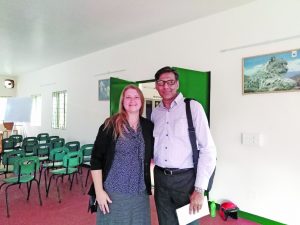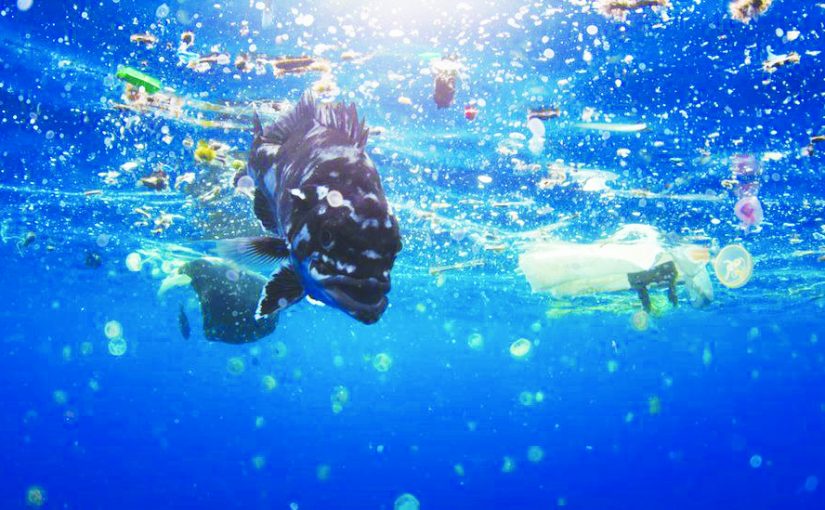AND TO think many of us are not even conscious of it! All the ways in which we use and abuse and chuck plastics in our life…mountains of plastics are piling up the world over. We patronize plastics in our day-to-day lifestyles like nothing else! So much so that micro plastic are now infiltrating into our food chain on which not just humankind but all life on earth depends to live…more to die nowadays. Prof Jenna R Jambeck of the University of Georgia was in Panaji to speak at a World Wildlife Fund India organized talk on September 20, 2018. I went to listen for garbage is one of my favourite subjects!
Prof Jenna is associate professor of environmental engineering and director of Center for Circular Material Management, University of Georgia, USA; a National Geographic Explorer and marine debris tracker…and she cares about what the mountainous non-biodegradable garbage of our world is doing to our once upon a time pristine earth — untouched by the mod con world of homo sapiens or humankind. At least in the first world countries, she indicated, they are beginning to do a lot about tackling non-biodegradable waste, and researching it big time too.

Prof Jenna R Jambeck has been travelling extensively in India to find about the Indian scenario vis-à-vis non-biodegradable waste and how it is impacting marine biology…she knows ways of dealing with plastics. How to stop manufacturing them, how to replace them, how to recycle them, “Most of it goes into landfills in the USA, about 60 percent of it but these are not in the coastal belts…” (which may be vulnerable to cyclones and tsunamis). The bottom line of all research today is finding ways to slow down global warming.
Plastic waste in the ocean is a global problem, she says, and we are all responsible, “We must all come together to solve this global problem.” She has been travelling over a fortnight in India to collect data on marine waste and what happens upstream and downstream rivers when a lot of non-biodegradable toxic waste is dumped into them. She has been travelling the world chasing environmental engineering solutions for over 20 years now and her current trip to India is sponsored by the US Consulate amongst others. Until 2001, she says, tons of waste was travelling in the oceans of the earth but nobody cared till then, “until the Alaskan fishing issue came up.” Since then she has realized the importance of conservation of our oceans, “For plastics don’t biodegrade or get digested but turn to micro plastics, micro beads, nano particles… gathering everywhere at the bottom of ocean beds.” It’s a kind of sediment taking a toll of marine life food chain and getting into our food chain too. It gets into the tissues, lungs, of marine life which suffers from respiratory, digestion, suffocation issues. It should bother us because micro plastics are in our food chain too, we must wake up to serious consequences and dangerous catastrophes in the making.
Prof Jenna has been part of beach clean-ups and community projects and yes, “Research today is seeing micro plastics in sewage!” In the Canary Islands once she was stunned to see “plastic confetti” at her feet, one was wading through it. She has a 10 years old son and fears for his future and she smiled when she saw that amongst the audience of mostly adults there was a child! In the US now such things as plastic straws have become an issue, some wanting a ban on them, but some saying they’re a boon to the handicapped…”So now the law says you may ask for them if you need them!”
Well, my dears, think about all this and don’t just think! If you’re nature’s child start by shunning itsy bitsy plastics from your life. Say no to those pretty little transparent plastic Amul ice-cream spoon or cutlery in any form in takeaways, shun plastic drinking straws, carry your own time-tested shopping cloth bags and take your own containers while buying home takeaways from restaurants…recycle, recycle like crazy, and best of all refuse to entertain plastics in your kitchen, while shopping for food and snacks…also no medicines, tonics, herbal health supplements in flimsy or any kind of plastic. Hard to do, oh yes, it’s the biggest challenge facing humankind today! Try, make a beginning somewhere. It will add up to count for something in the larger picture of life without plastics at home and maybe give or take a few decades global warming will go into remission.
On that note it’s avjo, politeverem, selamat datang, au revoir, arrivedecci and vachun yetta here for now!
— Mme Butterfly
ASK FOR CHANGE!
~ By Pracheta Budhwar
Like millions of others, I love Britannia biscuits and cakes. But the melting butter and chocolate leave a bitter taste in my mouth every time I think about the unnecessary plastic waste that is created with every purchase I make.
We know that plastic is extremely bad for the environment, especially single-use plastic. A United Nations Environment Program report states that the most common plastics emit traces of two powerful greenhouse gases that lead to further global warming.
warming.
But when I read a report by the National Institute of Environment Health Sciences, USA, which says that plastic interferes with our hormonal system leading to infertility and possible cancer, I realized, to my horror, that I and the billions of others on this planet are slowly poisoning ourselves to death.
That is why the UN has declared the theme for 2018 as #BeatPlasticPollution and on World Environment Day, India’s Union Environment Minister Harsh Vardhan vowed to eliminate all single-use plastics by 2022, the 75th year of India’s independence.
Britannia is one of the most loved food and beverage companies in India and it is celebrating its 100th year of doing business.
As per Varun Berry, MD Britannia, “The entire portfolio of Britannia products is going to change because we are changing the logo of Britannia and hence some of the packaging designs are changing and the formulations are changing”.
So, I took the opportunity to invite Britannia to start adopting sustainable packaging. Make the 100th year celebrations count for something unprecedented and lead the way for the rest of the industry to follow — I started a petition on change.org.
Sign my petition and urge Britannia to stop using plastic trays inside packets and replace them with eco-friendly, bio-degradable packing materials by World Environment Day 2019.
Companies across the globe are opting for sustainable and environmentally friendly alternatives like forming trays with 100% paper, sugarcane bagasse etc.
Do you know that:
India alone generates three tonnes of plastic waste every minute.
One truckload of garbage is emptied in our oceans every second.
Plastic packaging makes up to 40% of plastic pollution.
Plastic is killing us and the Earth we inhabit! Real danger is staring at our face and now is the only time to do something.
https://www.change.org/p/britanniaindltd-stop-using-plastic-trays-inside-biscuit-cake-packets-plasticfreesnacks
